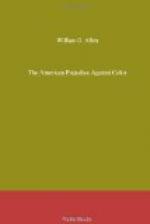INTRODUCTION
Many persons having suggested that it would greatly subserve the Anti-slavery Cause in this country, to present to the public a concise narrative of my recent narrow escape from death, at the hands of an armed mob in America, a mob armed with tar, feathers, poles, and an empty barrel spiked with shingle nails, together with the reasons which induced that mob, I propose to give it. I cannot promise however, to write such a book as ought to be written to illustrate fully the bitterness, malignity, and cruelty, of American prejudice against color, and to show its terrible power in grinding into the dust of social and political bondage, the hundreds of thousands of so-called free men and women of color of the North. This bondage is, in many of its aspects, far more dreadful than that of the bona fide Southern Slavery, since its victims—many of them having emerged out of, and some of them never having been into, the darkness of personal slavery—have acquired a development of mind, heart, and character, not at all inferior to the foremost of their oppressors.
The book that ought to be written, I ought not to attempt; but if no one precedes me, I shall consider myself bound by necessity, and making the attempt, lay on, with all the strength I can possibly summon, to American Caste and skin-deep Democracy.
The mob occurred on Sabbath (!) evening, January the 30th, 1853, in the village of Phillipsville, near Fulton, Oswego County, New York. The cause,—the intention, on my part, of marrying a white young lady of Fulton,—at least so the public surmised.
CHAPTER II.
Personalities.
I am a quadroon, that is, I am of one-fourth African blood, and three-fourths Anglo-Saxon. I graduated at Oneida Institute, in Whitesboro’, New York, in 1844; subsequently studied Law with Ellis Gray Loring, Esq., of Boston, Massachusetts; and was thence called to the Professorship of the Greek and German languages, and of Rhetoric and Belles-Lettres of New York Central College, situated in Mc. Grawville, Cortland County,—the only College in America that has ever called a colored man to a Professorship, and one of the very few that receive colored and white students on terms of perfect equality, if, indeed, they receive colored students at all.
In April, 1851, I was invited to Fulton, to deliver a course of Lectures. I gladly accepted the invitation, and none the less that Fulton had always maintained a high reputation for its love of impartial freedom, and that its citizens were highly respected for their professed devotion to the teachings of Christianity.




